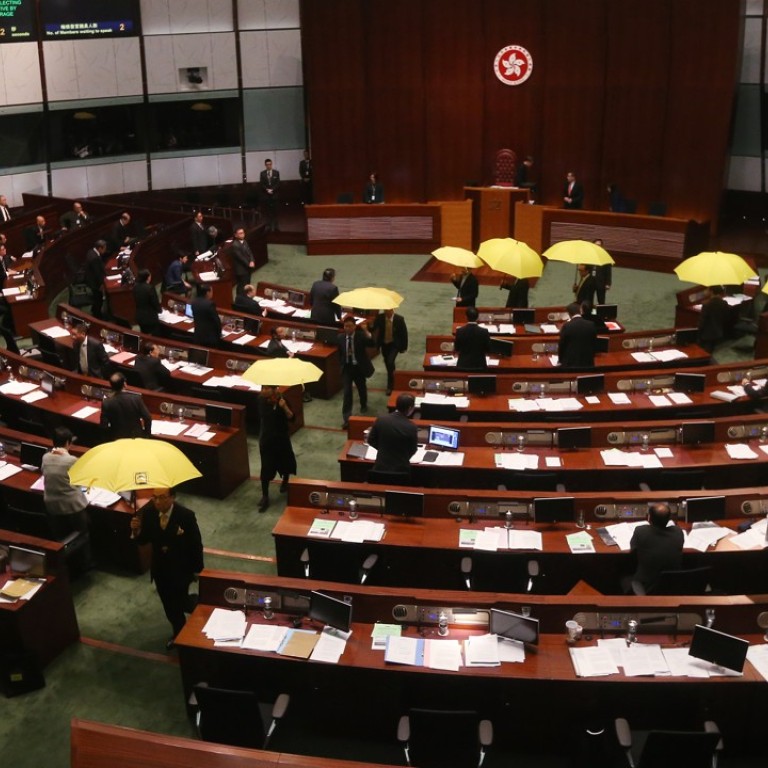
Letters to the Editor, July 30, 2017
Stop whining so that HK can move forward
I sincerely hope that it is being circulated in our schools and universities.
If the same levels of belief and pride could be displayed by the representatives in the Legislative Council, on both sides of the political spectrum, then we would have nothing to fear. Unfortunately, we are subjected to a gaggle of braying ninnies, whining when they want the rule of law and whining when the rule of law goes against them.
If Hong Kong can understand everything it has achieved through determination and self-belief, despite the mismanagement of Britain and China, then there is nothing to prevent us progressing even further with confidence and assurance.
If we respect ourselves, only then will we be respected by others and only then will China listen to what we have to say.
At certain points in our history, we had earned the right to speak whereas, right now, our speakers are whingeing to an empty auditorium. It is time for Legco to start earning.
John Dainton, Pok Fu Lam
Nations with claims want US Navy there
While your newspaper and China may not welcome the US Navy in the South China Sea, I suspect that all the other nations with territorial claims in the area strongly welcome its presence. No other country recognises China’s claims or its construction of artificial islands in the area. Indeed the world’s maritime international court in The Hague has ruled China’s claims to be invalid.
As these are international waters, the US, or the navies of any other countries, are perfectly entitled to assert their freedom of navigational rights in these waters.
Other claimants are at a huge disadvantage when negotiating with China because of the latter’s superior financial and military clout. China’s policy is always “Agree with us otherwise we will penalise you”. The argument that smaller nations choose to cooperate is irrelevant to freedom of navigation rights in the South China Sea.
It will be interesting if the newly launched state-of-the-art US aircraft carrier, the USS Gerald R. Ford, chooses to park in the vicinity of these Chinese-constructed artificial islands and to see if China’s second-hand carrier shows up.
Eric Edwin Taylor, Sai Kung
Euthanasia law can help the terminally ill
There are diverse views on euthanasia and whether it should be legalised in Hong Kong.
Opponents of legalising it say it weakens society’s respect for the sanctity of life, but I believe it should be allowed. People who are terminally ill and in great pain should be allowed to end their lives. This is especially important now that modern medicine has ways of prolonging life, even if the quality of that life is awful and the patient does not want it prolonged.
The right of a person to die in this way should be respected. We respect the right to life, so we should respect the right to die.
It allows them to preserve their dignity. One way to define dignity is allowing a person to make choices and respecting those choices. I have read about patients who went on hunger strike when medics refused to help with doctor-assisted suicide. Surely this is an affront to their dignity.
The law should only apply to those people who are so ill that death is inevitable. It also enables relatives to spend some quality time with these people knowing that they are about to be relieved of their pain.
Alvin Chan, Fo Tan
Allow children to be more independent
There are contrasting parenting styles which are at the opposite ends of the spectrum. There are those parents who are overindulgent and those who are too severe.
The former pretty much let their children do what they like, while the latter make all the decisions, in particular, about education. Children should be given some freedom. This encourages them to develop problem-solving skills and use their initiative to explore new things.
Children with what are known as “monster” parents lack the confidence to solve their own problems and just do what they are told.
I hope parents will encourage their sons and daughters to be more independent.
Anson Chan, Tseung Kwan O
Employers not impressed by local graduates
A recent survey showed that many Hong Kong teenagers do not see a bright future for themselves because of the wide gap between rich and poor and limited career opportunities.
Some university graduates struggle to find a decent job and employers complain they lack language, communication and critical thinking skills.
Bosses often prefer to recruit young people from the mainland or overseas because they are more capable. Therefore, young adults from Hong Kong become disillusioned, fearing that they will never earn enough to own a flat or start a business.
One problem is that some young Hongkongers lack the ability to try and help themselves. They sit and wait for opportunities to be presented to them.
The government should address this problem by having programmes in schools that help students improve their communication and critical thinking skills. They should be encouraged to actively grab chances that arise.
Cathy Yuen Tsz-wai, Hang Hau
Clarifying real creator of cartoon classic
Winnie the Pooh was the creation of A. A. Milne, an English author, humorist and regular contributor to Punch magazine, who first appeared in 1926. He featured in a number of stories with Christopher Robin, Milne’s son, and was named after his son’s teddy bear.
About this time, Walt Disney and his brother were making their names in animation in California, but it was well after Walt Disney’s death in 1966 that Disney, a far cry from the brothers’ original company, secured the rights to Winnie the Pooh, J. M. Barrie’s Peter Pan (1902), and other characters whose creators have become increasingly forgotten.
Disney, sadly, does little or nothing to acknowledge the talents of some who have contributed to its profits.
Peter Robertson, Sai Kung

